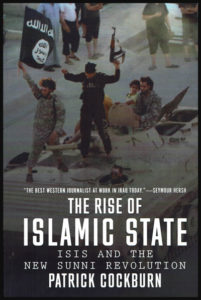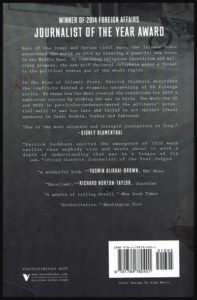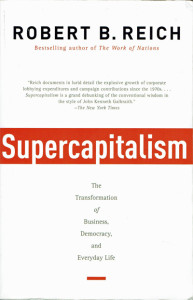“Patrick Cockburn spotted the emergence of ISIS much earlier than anybody else and wrote about it with a depth of understanding that was in a league of its own.” – Press Gazette Journalist of the Year Judges
The book presents a bigger picture of what is happening in the Middle East than what we are normally allowed to watch in the news. The reader is presented with both sides of several stories and this really helps to get a better understanding of the different conflicts.
Of lies and limited accuracy of the news
The author shows how lies are easily fabricated on a battlefield. He also explains the limited accuracy of news reports, such as when a “chosen” reporter is travelling, protected by an army or when reporters use second-hand information (often not verified) to prepare their news reports. It also seems pretty hard for a news channel to refuse to air a story when there are doubts about it, especially when all the competitors are reporting the same news.
I am including quotes (in italic) from the book as they provide excellent summaries. Some are from the author himself, others are from the sources he found to write his book. The author addresses so many subjects that it impossible to cover everything in a small review like the present one. So I’ll be as succinct as possible to present the reader with a broad idea of the book’s content.
Fear
Fear is the main factor behind many irrational political decisions. Fear leads to radical policies, religions and propaganda. It is often related to the fact that a very small group of people leading a country, a state or a region think that they can lose the political power that gives them undue privileges over the rest of their population. The greater the advantages, the greater the fear.
The political “solutions”, most of the time irrational, create tensions or aggravate the existing problems and only help to increase instability.
Saudi Arabia was initially helping ISIS because of fear of Jihadists operating within Saudi Arabia and fear of Shia powers abroad. As for Turkey, it is more afraid of the Kurds than it is of ISIS. So for a long period of time, it kept its border with Syria open: it helped ISIS to maintain a rear base.
The author says: “There is something hysterical and exaggerated about Saudi fear of Shia expansionism, since the Shia are powerful only in the handful of countries where they are in the majority or are a strong minority. Of fifty-seven Muslim countries, just four have a Shia majority” (p.102)
The demonization of religions other than Wahhabism
In the case of Saudi Arabia, the demonization of religions other than Wahhabism and the spreading of hate through social media have created a fertile ground for ISIS to grow.
The author says: “[…] The Saudis need a serious attempt to reform their educational system which currently demonizes Shias, Sufis, Christians, Jews and other sects and religions. They need to stop the preaching of hate from so many satellite stations, and not allow a free ride for their preachers of hate on the social media”.(p.107)
“The “Wahhabization” of mainstream Sunni Islam is one of the most dangerous development of our era” (p.108)
Money helps increase the polarization between Sunni and Shia
ISIS could not have risen without the financial help from Saudi Arabia, Qatar, United Arab Emirates and Turkey. Since ISIS thrives on tensions between Sunni and Shia, anything that increase that tension will benefit this terrorist group: “There is no doubt that well-financed Wahhabi propaganda has contributed to the deepening and increasingly violent struggle between Sunni and Shia” (p.99)
“A crucial feature in the rise of Wahhabism is the financial and political might of Saudi Arabia. Dr Allawi says that if, for example, a pious Muslim wants to found a seminary in Bangladesh, there are not many places he can obtain £20,000 other than from Saudi Arabia. But if the same person wants to oppose Wahhabism, then he will have “to fight with limited resources”” (p. 108)
“This polarization between the two religious groups was only intensified by the hot and cold war between the US and Russia. Proxies were at play here with Saudi Arabia and the Gulf monarchies, backed by the US, facing off against Iran, Syria, and Hezbollah in Lebanon, supported by Russia”(p.71)
Propaganda that made al-Qaeda look stronger and more effective than it actually was, with reference to the 9/11 attacks
There are multiple sections in the book which relate to the September 11th 2001 attacks. Here are some of the author’s observations (in italic). I have also added some personal comments which are clearly identified as such:
The Pearl Harbour moment of the 9/11 attacks
The author says: “The shock of 9/11 provided a Pearl Harbor moment in the US when public revulsion and fear could be manipulated to implement a pre-existing neo-conservative agenda by targeting Saddam Hussein and invading Iraq”(p.100).
Note: the following four paragraphs are my personal comments on the “Pearl Harbor moment”:
A “Pearl Harbor” moment means that in order for the American public to approve an attack in a foreign country, it needed to see something terrible happening in the United States. For example, before the very obvious destruction of war ships at Pearl Harbor by the Japanese, the American population refused to be engaged in World War 2.
During the 9/11 attacks and later on, the Pentagon’s eighty cameras have not captured anything close to a Boeing hitting the building. You had to believe that it happened the way the news told you since there were no pictures and no videos of a Boeing close to or in pieces on the Pentagon property.
The Medias showed instead, over and over, the World Trade Center Twin Towers crashing to the ground after being hit by one aircraft, even though the buildings were built to resist multiple impacts, through a “mesh” design, a lesson learned after what happened on the Empire State Building years ago. Some people believed that the buildings crumbled due to the high temperature, but most neglected the FEMA’s report that got out later on stating that the temperature never rose above 300 or 400 degrees in the buildings, hundreds of degrees short from what was needed to melt steel.
The free-falling towers of the World Trade Center were the Pearl Harbor moment needed to instill fear and facilitate the implementation of a pre-existing neo-conservative agenda. The American voters would not have approved a war abroad if the buildings had been standing after a single impact. It’s almost like the world should believe that the World Trade Center was built using the poorest American engineering possible, while not learning from lessons of the past. For more info on this specific subject:
In 2001, al-Qaeda was an “ineffectual” organization
Mr Cockburn is one of very few reporters who is not afraid to present al-Qaeda as it really was in 2001, an emerging organization that was far from being able to mastermind and execute complex attacks such as the 9/11 attacks. (This also explains why, soon after the attacks, international news reports presented a video of Ben Laden denying responsibility for the attacks. A video that was not shown ever again. But millions of people saw it before it was censored by the main news channels).
“At the time of 9/11, al-Qaeda was a small, generally ineffectual organization” (p.59). The term “ineffectual” refers to the inability to produce a desired effect.
The implementation of the neo-conservative agenda
This really means that the pre-existing American neo-conservative agenda could not rely on Al-Qaeda’s experience. Instead, one or more experienced organizations were needed for the financing, planning and execution of the 9/11 attacks. Only after the facts could the blame be put on Al Qaeda since it was, after all the media propaganda, very well-known to the American public. An artificial link was then made with Iraq, allowing for an invasion that sixty percent of the American voters approved.
Sixty percent of the US voters were misled
“The name al-Qaeda has always been applied flexibly when identifying an enemy. In 2003 and 2004 in Iraq, as armed Iraqi opposition to the American and British-led occupation mounted, US officials attributed most attacks to Al-Qaeda, though many were carried out by nationalist and Baathist groups. Propaganda like this helped to persuade nearly 60 percent of US voters prior to the Iraq invasion that there was a connection between Saddam Hussein and those responsible for 9/11, despite the absence of any evidence for this. In Iraq itself, indeed throughout the entire Muslim world, these accusations have benefited al-Qaeda by exaggerating its role in the resistance to the US and British occupation” (p. 53).
The fall of Mosul
ISIS needed only 6000 fighters to win the Battle of Mosul. Yet, they were facing one million Iraqi soldiers. How was that possible? The author sees three reasons:
- The cooperation from the Iraqi Sunnis, who were sensing that they would be better off with ISIS than the Shias.
- Corruption at all levels in the Iraqi army. “As one former minister put it “the Iraqi government is an institutionalized kleptocracy”. Another politician who does not want to be named says “[…] People pay money to get into the army [so they can get a salary] – but they are investors not soldiers” (p.77)
- The fact that the Iraqi army was no longer a national army since the well-trained Iraqi Sunni soldiers were sidelined.
Syria: President Bachar Assad was not as weak as expected
Both the outside world and opposition viewed President Assad as far weaker than he actually was. They both thought that he would be defeated without an organized air campaign.
A major oversight on the war in Syria
“A blind spot for the US and other Western powers has been their failure to see that by supporting the armed uprising in Syria, they would inevitably destabilize Iraq and provoke another round of its sectarian civil war” (p.73)
Five different conflicts within Syria
The Syrian conflict is extremely complicated since there are many different political and religious interests at stake: “The Syrian crisis comprises five different conflicts that cross-infect and exacerbate each other. The war commenced with a genuine popular revolt against a brutal and corrupt dictatorship, but it soon became intertwined between the Sunni against the Alawites, and that fed into the Shia-Sunni conflict in the region as a whole, with a standoff between the US, Saudi Arabia and the Sunni states on the one side, and Iran, Iraq and the Lebanese Shia on the other. In addition to this, there is a revived cold war between Moscow and the West, exacerbated by the conflict in Libya and more recently made even worse by the crisis in the Ukraine” (p.94)
In Syria, it is either Assad or ISIS
ISIS is the strongest opposition force in Syria. If Assad falls, ISIS takes his place: “Syrians have to choose between a violent dictatorship, in which the power is monopolized by the presidency and brutish security services, or an opposition that shoots children in the face for minor blasphemy and sends pictures of decapitated soldiers to the parents of their victims.” (p.81)
The God-given victories
“The appeal of the Islamic State to Sunni Muslims in Syria, Iraq, and across the world comes in part from a sense that its victories are God-given and inevitable, so any failure damages its claim to divine support” (p.159)
The solution to the Syrian conflict will come from outside the country
“Many Syrians now see the outcome of their civil war resting largely with the US, Russia, Saudi Arabia, and Iran. In this, they are probably right”.
Side notes
War is never about “combat” only. There is always an underlying political process going on. So, even if a country seems defeated militarily, enormous political efforts will have to be made in order to create a new stable order.
“Conviction that a toxic government is the root of all evil is the public position of most oppositions, but it is dangerous to trust one’s own propaganda”.
“A government or an army can try to maintain secrecy by banning reporters but they will pay the price as the vacuum of news is filled with information supplied by their enemies”.
Title: The Rise of Islamic State (First published under the title The Jihadis return: ISIS and the failure of the global war on terror by OR Books ©2014)
Author: Patrick Cockburn
Editor: Verso
©2015
ISBN-13: 978-1-78478-040-1


